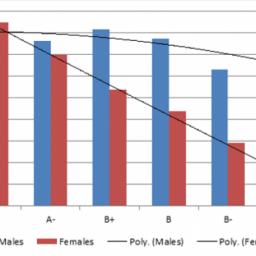Women Avoid STEM Degrees to Get Better Grades?
 Catherine Rampell at The Washington Post has "A message to the nation's women: Stop trying to be straight-A students."
Catherine Rampell at The Washington Post has "A message to the nation's women: Stop trying to be straight-A students." In her analysis of others' findings, she writes of a discouragement gradient that pushes women out of harder college degrees, including economics and other STEM degrees. Men do not seem to have a similar discouragement gradient, so they stay in harder degree programs and ultimately earn more. Data suggests that women might also value high grades more than men do and sort themselves into fields where grading curves are more lenient.
"Maybe women just don't want to get things wrong," Goldin hypothesized. "They don't want to walk around being a B-minus student in something. They want to find something they can be an A student in. They want something where the professor will pat them on the back and say 'You're doing so well!'"Why are women in college moving away from harder degrees?
"Guys," she added, "don't seem to give two damns."
I'd say this lady's on the mark from my own experience. I know that when the going got tough, I avoided the fuck out of the classes in question - to the point of not even bringing in projects. If I could've skipped it, or dropped it, I would have. It wasn't that I minded the challenge or disliked the material - I loved both. It was that I disliked the conflict .
The conflict was with the prof, who was irritated at having to instruct girls and seemed to dislike me in particular, though I may have been projecting; it was with the other students - the males were convinced this was awesome and got correspondingly great grades, and the females thought it was irrelevant to their chosen career of 'kindergarten teacher', and probably influenced the prof's low opinion of them; and of course the conflict was with my family as I "failed" to do well - anything below an A- was unheard of. My first B persuaded me into avoiding the class - after which I nearly failed it completely, due to avoidance. I felt like I didn't belong in that room, and the prof and other students either did nothing or went out of their way to encourage that feeling.
I had been thinking about a career in chemistry - the math appealed to me. The B in physics introduced doubt. I knew I knew the stuff, I was very good at getting my head around most of the concepts - but if I couldn't even handle the first set of midterms, what was I getting myself into? Would I even be able to take on the tougher stuff in my favorite classes? I went quickly down to a D as apathy set in, and it still bugs me to this day. If something had been done differently, would I have done better in that class? Would I have chosen to go ahead and do some serious college instead of jumping straight into IT? The biggest problem, though, was not "OMG a B", it was "Well, I'm not going to succeed at this ; I guess I'll stop trying." Maybe if I'd known to redefine "success" for that particular class, I'd have adjusted that attitude, which cost me a potential career.
Redefining success, however, requires redefining a bunch of preconceptions: my family's, the prof's (he damn well knew an "A" counted as "success", and considered "B" to be inferior, and honestly, he seemed to consider most of his students inferior!), and the other students', not just my own. When that many people are telling you something, maybe you oughtta listen to them. These attitudes don't exist in a vacuum. Somebody, somewhere, said, "A means you're good at this and should keep doing it." I hadn't gotten A's. This wasn't like gym class, either, where I could convince myself that I was mechanically inferior in some way. This was a straight up, "You're not smart enough." And being a kid, I bought it.
Maybe I really wasn't good at it, maybe I was - I have no idea whether my initial grade was sexism, a failure to communicate, or just plain being new at the concept. It certainly wasn't the math questions I had problems with. I probably lost points on essay questions, since we didn't start practical projects until later in the year. Essay question grades can be (and very likely are ) influenced by the gender of the writer and the prejudices of the reader. Half of me would love to blame that "lower" grade on something, if only on my prof's bullish stubbornness to actually reward in a standard fashion. The other half knows damn well that my reaction is what killed the potential career, not his grading. So... yeah, she's right. I should've sucked up the B and not given a damn. Unfortunately, I didn't learn to do that for two more years, and by that time I was sick of school.